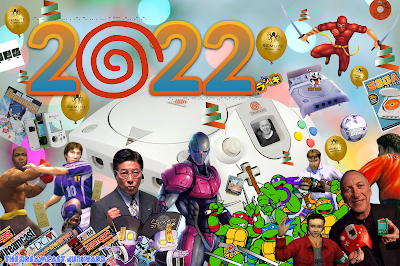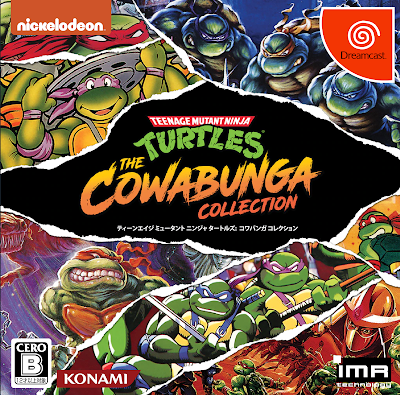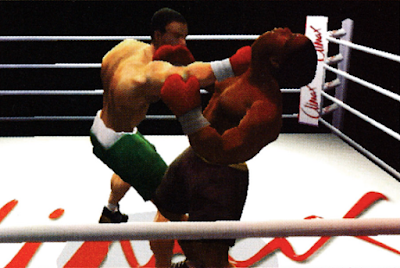Well, another whole year has come and gone, and we're all a little older and a little wiser. All a little bit more wrinkly and decrepit. All a bit more wizened and broken. All a bit more...I think you get the idea. Anyway, as has become something of a custom here at The Dreamcast Junkyard, we thought it would be totally radical (dude) to round up the majority of the content we've posted here over the last 12 months; so you don't have to navigate the archive using that unweildy little sidebar thing.
Huge thanks must go to all the people who have continued to create content that we report on, and of course to those who have agreed to guest on our podcast. Thanks also to the team members who write the features, the news posts and the reviews; and of course thank you to you - our readers - who continue to visit the Junkyard year in, year out.
For your reading pleasure, presented below in a digestable list are some highlights from 2022. Not everything we've published is included, but if you're reading this on the desktop version of the blog you'll find the aforementioned unweildy little sidebar archive just down there on the right, from which you can find everything from not just 2022, but from the last 18 years of The Dreamcast Junkyard...
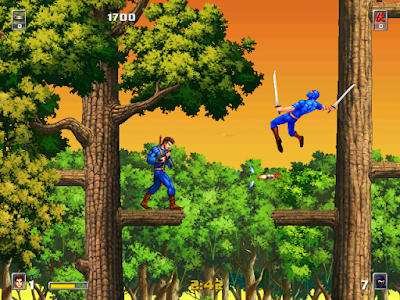 |
| Shadow Gangs |
Reviews
- Ghoul Grind: Night of the Necromancer - Mike cast a critical eye over Woog Worx's interesting retro-styled, auto-scrolling, Halloween-themed platform adventure, and was particularly impressed with just how well executed the whole affair was.
- Postal - Lozz suited up and dove in to Dan Redfield and WAVE Game Studios' Dreamcast fantastic release of Running With Scissors' blood-soaked 90s shooter, and was pretty impressed with what he saw. Twin Stick controls and complete DLC included on the disc were particular highlights.
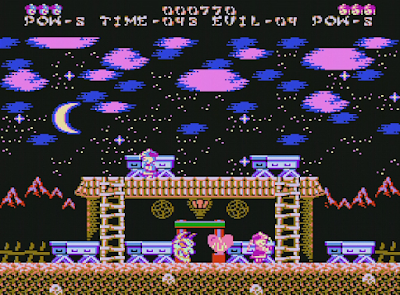 |
| Yeah Yeah Beebiss II |
- Yeah Yeah Beebiss II - In 2022 the Dreamcast played host to a port of a sequel to a game that never actually existed. That port was the simple yet enjoyable Yeah Yeah Beebiss II and Tom found that while the game was quite basic in design, it was also quite a fun little title.
- Shadow Gangs - Showcasing just how diverse the range of new Dreamcast releases were in 2022, Lozz took a look at the visually impressive side scrolling brawler Shadow Gangs. While the aesthetics were a highlight, the game's difficulty level was seen as a slight negative.
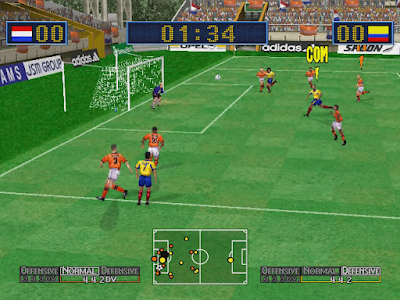 |
| Virtua Sriker 2 ver 2000.1 |
Retrospectives
- Virtua Striker 2 - When is a football game not a football game? When it's Virtua Striker 2 of course! Tom took to the pitch in Sega's arcade football fest to see if Virtua Striker 2 holds up.
- The Flashback series on Dreamcast - The Dreamcast has now recieved officially sanctioned ports of both Flashback and sequel Fade to Black. We joined Conrad B. Hart to see how well these ports fared on the Dreamcast.
- Nettou Golf - Kev switched off Giant Killers, donned his most hideous golfing attire and interrupted a good walk when he investigated Nettou Golf, an NTSC-J title which he found to be surprisingly good fun.
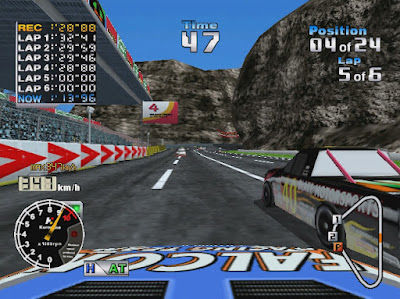 |
| Maximum Speed |
- 90 Minutes: Sega Championship Football - 90 Minutes represents one of the most turgid footballing experiences one can find on Dreamcast; however the NTSC-J version (titled J.League Spectacle Soccer) is one of the very best to grace a GD-ROM drive. How so? Find out in Tom's retrospective!
- Maximum Speed - The Atomiswave played host to a number of interesting games that were never ported to other platforms, and Maximum Speed is one such title. A sort of Daytona-lite that features stock and open wheel vehicles, and some of the most annoying sound effects you're ever likely to hear.
 |
| Flyer for Premier Eleven |
Features and News
- The Hunt for Premier Eleven - Premier Eleven is often seen as the greatest football game the Dreamcast never got. By 'often,' we mean 'by us.' This elusive Atomiswave title does exist in very limited numbers out in the wild, but so far it remains undumped. Join us on this most whirlwindy of investigations.
- Brave Little Abacus - Lewis went down the rabbit hole of discovering why this celebrated band used a Dreamcast during their live shows, and even managed to bag an interview with Brave Little Abacus frontman Adam Demirjian, who explained the reasoning behind it, as well as his general admiration for the console.
- Dreamcast translation projects - The Dreamcast English translation scene appears to be going from strength to strength, and so our resident translations specialist Lewis brought us news on projects involving such NTSC-J titles as Radirgy, Chaos Field, Panzer Front, Puyo Puyo~n, Cool Cool Toon and RUN=DIM as Black Soul.
 |
| RUN=DIM as Black Soul |
- The Dreamcast indie scene enters a 'Golden Age' - Lozz took a deep dive into the indie scene on the Dreamcast, as more and more games are released and new publishers enter the Dreamarena (sorry).
- Where are they now? - ODM's '100+ New Games' - The Official UK Dreamcast Magazine famously printed a '100+ New Games' feature in the July 2000 issue, and so Andrew decided to delve into the history books to find out what happened to them all. Did all of these games materialise...or was it all just pie in the sky?
- VM2 'next-gen VMU' from Chris Daioglou - Serial Dreamcast peripheral upgrader Chris Daioglou returned in 2022 with a vision for a next-gen VMU. Titled VM2, the project was launched on Indiegogo and smashed its funding goal. Read about it here.
 |
| RIP Mr Yukawa |
- A farewell to Hidekazu Yukawa - News of former SEGA Japan Managing Director Hidekazu Yukawa's passing was reported in June 2022, after the great man died in June 2021 aged 78. Here, Lewis respectfully paid tribute to his legacy, and detailed every time Mr Yukawa appeared in a Dreamcast game. Rest in peace Mr Yukawa, gone but not forgotten.
- Gauntlet Giveaway! - Midway's Gauntlet Legends offered a pretty sweet deal to anyone who bought the game - send in proof of purchase and receive a set of pewter miniatures based on characters from the game. Through a series of bizarre events, Tom ended up with a set of these miniatures and here's what he thought of them.
- The 'All About Dreamcast' VCD - Lozz managed to bag himself a copy of a Chinese-language VCD sold in Hong Kong and Taiwan titled 'All About Dreamcast,' and being the dutiful digital preservationist that he is, then went and ripped it and uploaded the contents to YouTube.
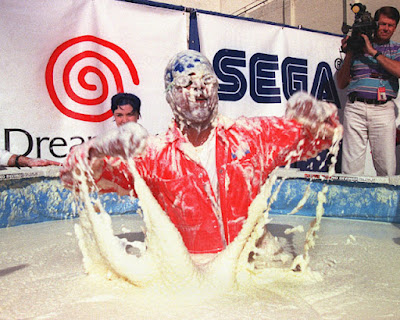 |
| SEGA Spud Dive |
- Is video of the Sega Spud Dive lost media? - The Sega Spud Dive was a publicity stunt that involved people swimming through vats of mashed potatoes to win Dreamcast related prizes, and we've covered it several times here. However, there doesn't appear to be any video of the events...which is odd considering the numerous film crews in attendance.
- Remute Generations - A music CD with exclusive Dreamcast functionality and visuals created by Duranik? Yes please! Here, Tom took a look (and a listen) to Remute's latest release - Generations.
- Title Defense: Dreamcast's lost boxing sim - Title Defense was intended to be a more simulation-based alternative to Ready 2 Rumble, but sadly it was never released. That didn't stop the game being featured quite regularly in magazines of the era. Tom took a look at what could have been, had Climax not shelved this intriguing title before it could muster a defense. See what I did there?
 |
| [lock-on] Volume 003 |
- [lock-on] Volume 003 Dreamcast special - [lock-on] Volume 003 offered a veritable smorgasbord of Dreamcast content, some of which was created by the very people who write the guff on this blog. Once the disclosure was out of the way, Tom took a look between the pages and offered a wholly unbiased opinion.
- Dee Dee Planet playable online - Dee Dee Planet was a pseudo sequel to ChuChu Rocket! that would offer online gaming to Dreamcast owners. Sadly, it was never released. That was until the Dreamcast community got hold of it, released it and added online functionality in 2022. Most impressive.
- Dreamcast Mini: Hopes and Prospects - The promise of a 'Dreamcast Mini' has been doing the rounds online for years, but how would it work, really? Would Sega even be able to turn a profit from such an expensive endevour? Lozz threw caution to the wind and offered his thoughts.
 |
| RIP Bernie Stolar |
- Show Report: Nottingham Video Games Expo - The Junkyard Crew took a rare trip out into the real world to take part in NottsVGE, where we met some industry legends, drank some beer, played some games and generally had a thoroughly nice time.
- TMNT: The Cowabunga Collection lands on Dreamcast - Dreamcast coding legend Ian Micheal decided that he wasn't overly impressed with Konami's decision to skip the Dreamcast when it came ot releasing TNMT: The Cowabunga Collection. So he went ahead and created his own version...which is arguably better than Konami's. So there.
- Bernie Stolar sadly passes away - The late Bernie Stolar is credited as being the father of the Dreamcast, and it was with great sadness that we learned of his passing in June 2022, aged 75. In this rather sombre news update, we paid our respects to the gaming industry giant. Rest in peace Bernie Stolar, who will forever be remembered as the force behind the creation of the Dreamcast.
 |
| Dreamcast Gold Ingot from RetrOldTech |
- There's gold in them there Dreamcasts! - Lewis took a look at the tongue-in-cheek offering of a gold bar made from reclaimed precious metals out of Dreamcast consoles. Clearly a prank novelty item from RetrOldTech, but one we couldn't help but applaud for its downright weirdness.
- Dashy no Blast demo released - Talented indie developer Voxel surprised us all with the release of playable Halloween-themed demo Dashy no Blast in October 2022. Playing like a better version of Cannon Spike, this promising demo hit all the right notes.
- Cuphead on the Dreamcast?! - Developer Aionmagan created this rather nifty proof of concept Cuphead demo for the Dreamcast back in June. While it is very limited in scope (it's basically one screen), it proved that the Dreamcast could cope with Studio MDHR's amazing animations, if nothing else.
 |
| Dreamcast magazines for preservation |
- Dreamcast Magazines: Appreciation and Preservation - Lozz presented this rather well researched appeal for Dreamcast magazine preservation, taking a look at the various periodicals that catered for the platform and asking for Dreamcast owners to plunder their attics and cupboards for missing issues.
- RetroAchievements adds Dreamcast support - Ross popped up after a lengthy hiatus to report on RetroAchievements adding Dreamcast games to its database of supported titles. For those uninitiated, RetroAchievements basically adds trophies to games from all manner of classic systems, so having Dreamcast added was a pretty big deal.
- Using AI art to create Dreamcast images from hell - On a particularly boring day back in May, Tom decided to see what would happen if he prompted an AI image generator with terms like 'Dreamcast' and 'Jet Set Radio.' This article was the result. You're welcome.
 |
| Sonic Adventure |
- Sonic Adventureland: A Roller Coaster of Love - Brian bought a ticket and took a ride through Sonic Adventure's numerous roller coaster themed Action Stages, reminiscing about some of the real life theme parks he'd also visited along the way.
- SEGA Powered issue 5 - Issue 5 of SEGA Powered magazine was fairly heavy on the Dreamcast content, and naturally we thought it would be nice to have a flick through its pages here at the Junkyard.
- Hermes: Limited Edition - Lewis finally managed to snag a copy of the excellent indie title Hermes, and it was a copy of the rather nice limited edition which came bundled with a special Hermes-branded VMU.
- Spring News Round-up - A lot of Dreamcast news happened during the month of April, and Lewis was on hand to document the creation of a Dreamcast bedding set, the release of a Mega Duck emulator and a bunch of new indie games.
Interviews
- Driving Strikers - Jaz tracked down and chatted with Luke 'Kazade' Benstead to discuss the concept behind the upcoming online-enabled Rocket League style title for Dreamcast, Driving Strikers.
- Video Game History Foundation - wasn't really sure where to put this one so I settled on including it here. Tom and Brian joined Frank Cifaldi and Kelsey Lewin from the Video Game History Foundation's History Hour podcast to discuss the US and European launches of the Dreamcast, and also the history of this very blog.
DreamPod episodes
If you're a regular listener to our podcast, then you'll know that we occasionally have special guests on the show to discuss their own history with the Dreamcast. Below are some of the highlights from the past year, however all of our regular 'news' episodes can also be found at Buzzsprout here.
- In DreamPod 103, we welcomed writer, producer and director Jörg Tittel, who previously wrote for the Official US Dreamcast Magazine. In this wide ranging chat, Jorg discussed how he got involved in writing for the magazine, and how his friendship with the late Shinya Nishigaki resulted in a cameo appearance in Illbleed.
- DreamPod 106 saw us welcome WAVE Game Studios' Daniel Crocker and SEGA Powered editor Dean Mortlock. In this episode we chatted about how WAVE Game Studios was formed and how they have taken the Dreamcast scene by storm; and we also discussed Dean's history in magazine publishing, from his time at SEGA Power through to his latest venture SEGA Powered.
- Shenmue Dojo were our honoured guests on DreamPod 108, with James Brown and Matt Oliver joining us to discuss all things Shenmue. From the origins of Shenmue Dojo, to the release of Shenmue World, thoughts on the cancellation of the Shenmue animated series, and even a Shenmue quiz, if you're a fan of Yu Suzuki's magnum opus, this episode will be right up your street.
- DreamPod 109 was tinged with both sadness and joy, as while it was a characteristically enjoyable romp through the year 2002 with the team from Dreamcast Years, it also marked the very last episode of the DCY Podcast (well, unless you backed the physical minidisc release of the actual final, final episode as part of the Dreamcast: Year Two book).
- Our guests for DreamPod 111 were Dan 'The Mega' Driver and James 'The Segaholic' McGhie, who together are known as The SEGAGuys. In this episode, we chatted about Dan and James' entry into the world of Sega, their own podcast and YouTube channel, hypothetical Dreamcast sequels and of course there was a Sega-themed quiz.
- In DreamPod 112 we were lucky enough to be joined by former SEGA Europe marketing director Giles Thomas, who spoke to us about how he was handed the task of launching the Dreamcast in Europe. From his time at MTV and VH1 music channels to joining Sega and overseeing the marketing campaign across the continent, Giles offered us a goldmine of interesting tales from the early days of the Dreamcast.
 |
| "Cupcake anyone?" |
Videos
- Giant Killers series - I felt it was only right to include this here simply due to the sheer amount of love Kev (pictured above, replete with his stash of cupcakes) has poured into this series. Yes, if you find yourself yearning to watch a middle-aged man from Northamptonshire play through season after arduous season of Dreamcast football management sim Giant Killers, then you are in for a treat. Head over to our YouTube channel and feast your eyes and ears on Kev's superlative series. Don't bother looking at any of the other recent stuff as it's pretty much all embedded in the articles featured above. I just wanted to give Kev some recognition for this labour of love. And mention his cupcakes again.
What's next?
Naturally, we can't predict the future. However what we can do is commit to continuing the same level of slightly obsessive coverage of any and all noteworthy Dreamcast related news happenings, and a steady stream of new podcast episodes, news, reviews and features over the next 12 months. Everything we produce here is done purely for a love of the topic, none of us do this as a regular job - we are simply a rag tag band of hobbyists (if that's the right term). If you'd like to support us though, you can do so by visiting our 'Buy me a Coffee' page here.
You can also continue to follow us on Twitter, join our Facebook group, join our Discord, subscribe on YouTube or simply leave us a nice (or horrible) review over on Apple Podcasts (or wherever you may get your podcasts). It all helps and is hugely appreciated. Here's to another great year of Dreamcast related goodness.


